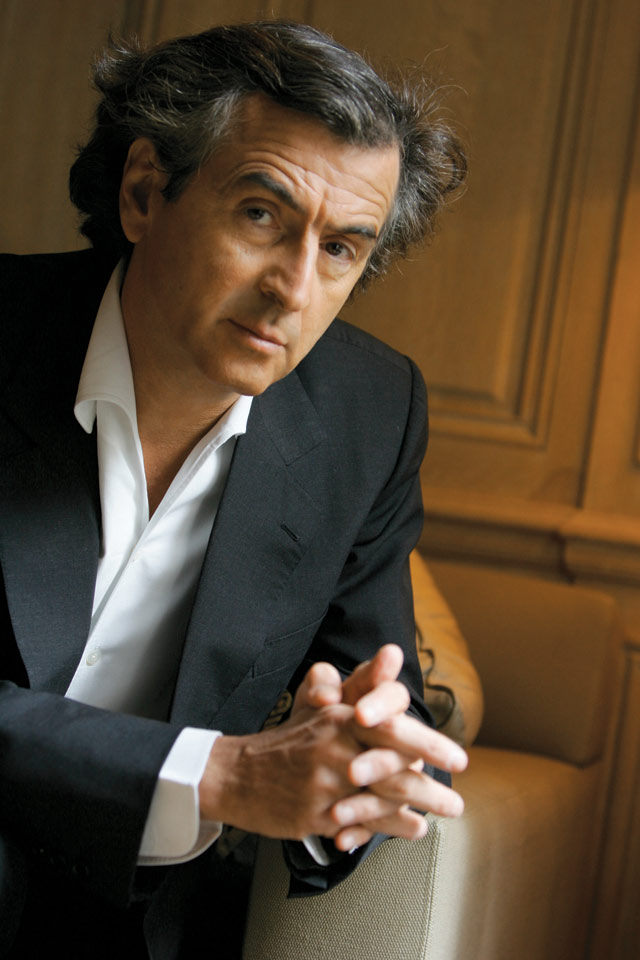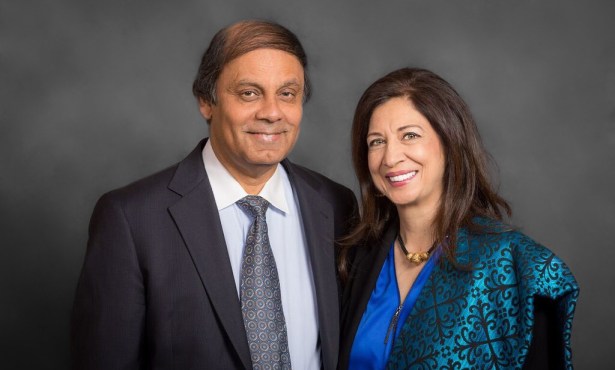Bernard-Henri Lévy Discusses New Book, ‘The Genius of Judaism’
French Intellectual Expounds on Anti-Semitism in Our Time
Bernard-Henri Lévy, or BHL as he’s known in France, is that rare bird — a public intellectual and a crusader. He has campaigned for Bangladesh independence and has been a staunch ally of the Kurds, and single-handedly instigated the world’s intervention in Libya — or so many believe. A former socialist, he was a founder of the “Nouveaux Philosophes” movement in 1976 and is an agile, combative — not to mention telegenic — debater on all matters great and small.
I heard from Lévy a few days ago — literally from the battle of Mosul, where he has been with the Kurds during the ongoing siege — to discuss his new book, The Genius of Judaism, a provocative discourse on Jewish thought and anti-Semitism, along with the uncertain future of Jews in the age of Trump, Brexit, the Palestinian-led Boycott, Divestment, Sanctions (BDS) movement, and the perils of Islamic extremism.
Lévy will be speaking at UCSB’s Campbell Hall this Saturday, January 14, at 8 p.m.

You cite the history and origins of anti-Semitism and point out its current incarnations. Is fundamentalist/extremist Islam the most dangerous form of it today? Well, Islamic extremism is indeed fundamentally anti-Semitic for the simple reason that it rejects Islam’s debt to Judaism and nurses the illusion of a spontaneously created Islam. In the course of this delusion about its own origins, it has to deal with Judaism, which is the origin par excellence, the beginning of the beginnings, the body of thought to which all monotheistic religions, Islam included, are inextricably indebted.
Islamic extremists do not want to hear about this debt or any other, which is why they harbor the same hatred for Christianity, to which Islam is also indebted. Parenthetically, that is one of the reasons for today’s new alliance of Christians and Jews: They face a common and violent enemy.
While the BDS movement is pervasive in Europe, it is gaining popularity in the U.S.; even at UCSB, students speak of instances of anti-Semitism that they believe stemmed from BDS. But for some in this generation, it is almost like their Vietnam. Or is anti-Semitism, as you say, dressed up as anti-Zionism, more pernicious? In your view, what are BDS’s most grievous flaws? The Vietnam generation was fighting for and in the name of freedom, rights, and democracy. The BDS generation is fighting for exactly the opposite.
We should never forget that the first people in the modern era to have called for sanctions against Israel, then in its embryonic state, were former Nazis living in exile in the Middle East after the Second World War. We should not forget that the leaders behind BDS are on record opposing the two-state solution and thus peace between Israelis and Palestinians. Nor should we forget that the Palestinian movements that BDS supports [e.g., Hamas] are bigoted, intolerant, authoritarian, and hostile to women and minorities.
How do Brexit, Farrage, Le Pen, and now Trump figure into the surfeit of anti-Semitism? There are a host of contradictions here in respect to Jews and Israel. True. Take Trump, for example. Until very recently, he made statements strongly tinged with anti-Semitism (as when he said to a group of Jewish Republicans, “You’re not going to vote for me because you know I don’t want your money”).
On the other hand, he sets himself up as a friend of Israel. … I very much hope that I’m wrong, but I tend to believe that any love for Israel that is not based on a sincere appreciation of the Jewish people and their traditions of thought will not last.
How much is The Genius of Judaism your response to the godless intellectualism of the Socialists/Marxists, and how much to the anti-Semitism seemingly woven into French society? Both are important. [But] the heart of the book is in the affirmation of the values of Jewish thought. It is in the defense and illustration of what I call the glory and strength of the Jews — [and] both terms I intend in the spiritual rather than the trivial sense.
The Kurds appear to be the best friend of the West, though are never treated as such. What do you see as their future with a potential Turkish/Russian/Trump alliance? I made a documentary titled Peshmerga that was filmed along the 600-mile front between Daesh [ISIS] and the Kurds. One of the many things that I took away from that effort was the deep respect of the Kurds for Jewish memory and, in particular, for the part of that memory that occurred on their land.
I filmed many examples of that respect, which is as rare (in the region) as it is moving. Set against that, you have the ingratitude of the international community toward the Kurds, an ingratitude that is not going to be resolved or improved by a Russo-Turko-Trumpist alliance. Will the Kurds be the fall guys once again? Will the world perpetuate the historic injustice that for a century has left the Kurds without the state that is rightfully theirs?
In your view, Jews being called “the chosen people” is a huge and woeful semantic error. But it is unclear to me what you regard as the accurate translation. The treasured people, [those who are the] depository of a treasure, a treasure that belongs not only to them but also to all nations, to all of humanity. The Jews, in other words, have a responsibility to and for the world. To be a Jew is to be in a relationship not with oneself but with others. And this relationship is called messianism.
You write that 75 percent of Israel’s Arabs or Muslims would not trade their life in Israel for any “Arab country.” Explain. In fact, I believe that the entire Arab population of Israel knows that they enjoy, in Israel, civil and human rights and freedoms that they would not enjoy elsewhere in the Arab world.
Where does one find the freest Arabic-language newspapers? In Israel. Where do Arab workers have an absolute right to protest, demonstrate, and unionize? In Israel. Where can they count on defending their rights in court, even up to the highest court of the land, when they are wronged? In Israel. Where are they most free to obtain medical care, pursue their education, and to travel? In Israel.
Do you have a personal faith? No, I don’t “believe” in God. And, to be frank, I am not sure that “believe or not” is so much the question. It is a question for Christians. It is a question for Buddhists. But is it a question for Jews who always said that Judaism is matter of “study” more than of “belief”?
When Gaon of Vilnius has to choose between a lazy student who believes and an ardent, vibrant student who doubts, he says that he prefers the second. So do I. To be a Jew means to me intelligent, not to be extatique. What is required is to question, doubt, and understand the world, not to lose oneself in the warmth of a supposed communion. Talmud, not Pascal’s Wager [argument in the belief in God]!



